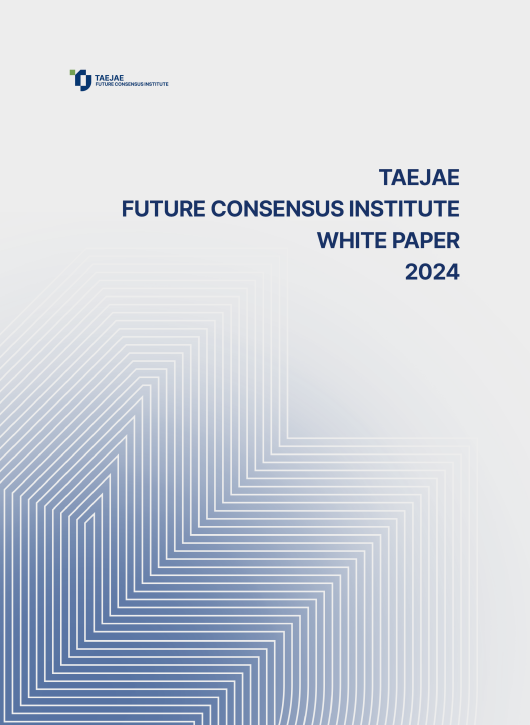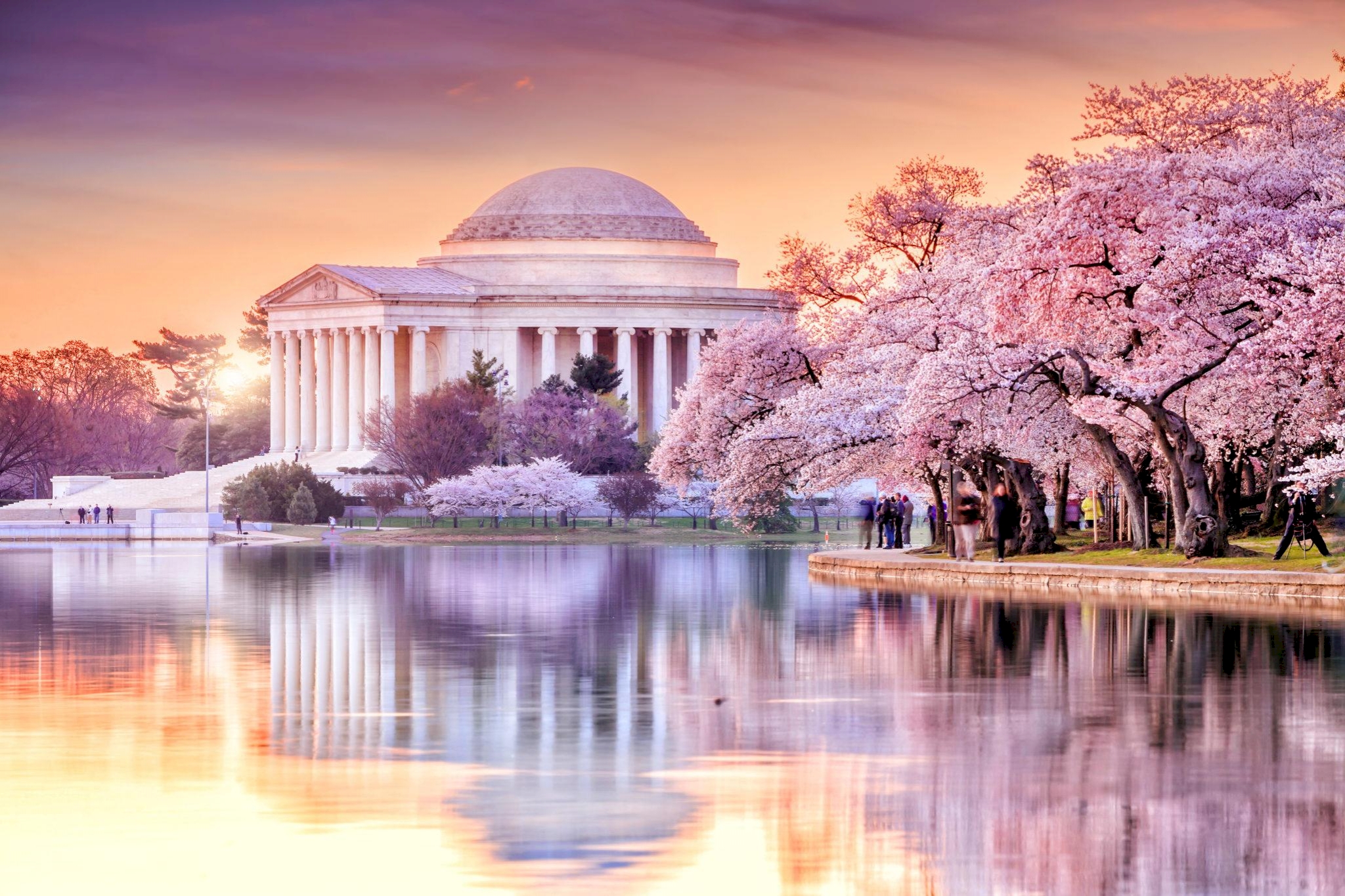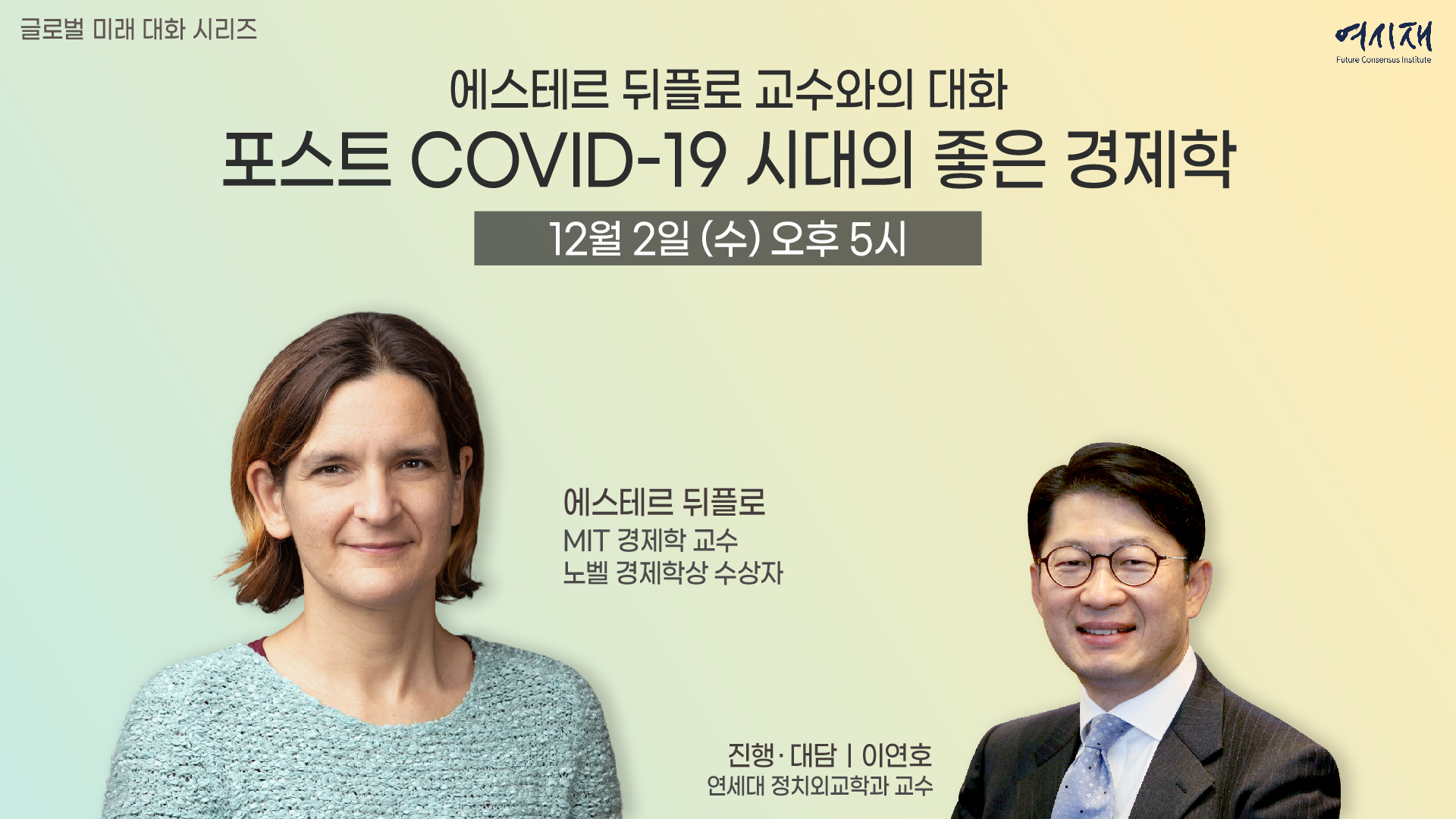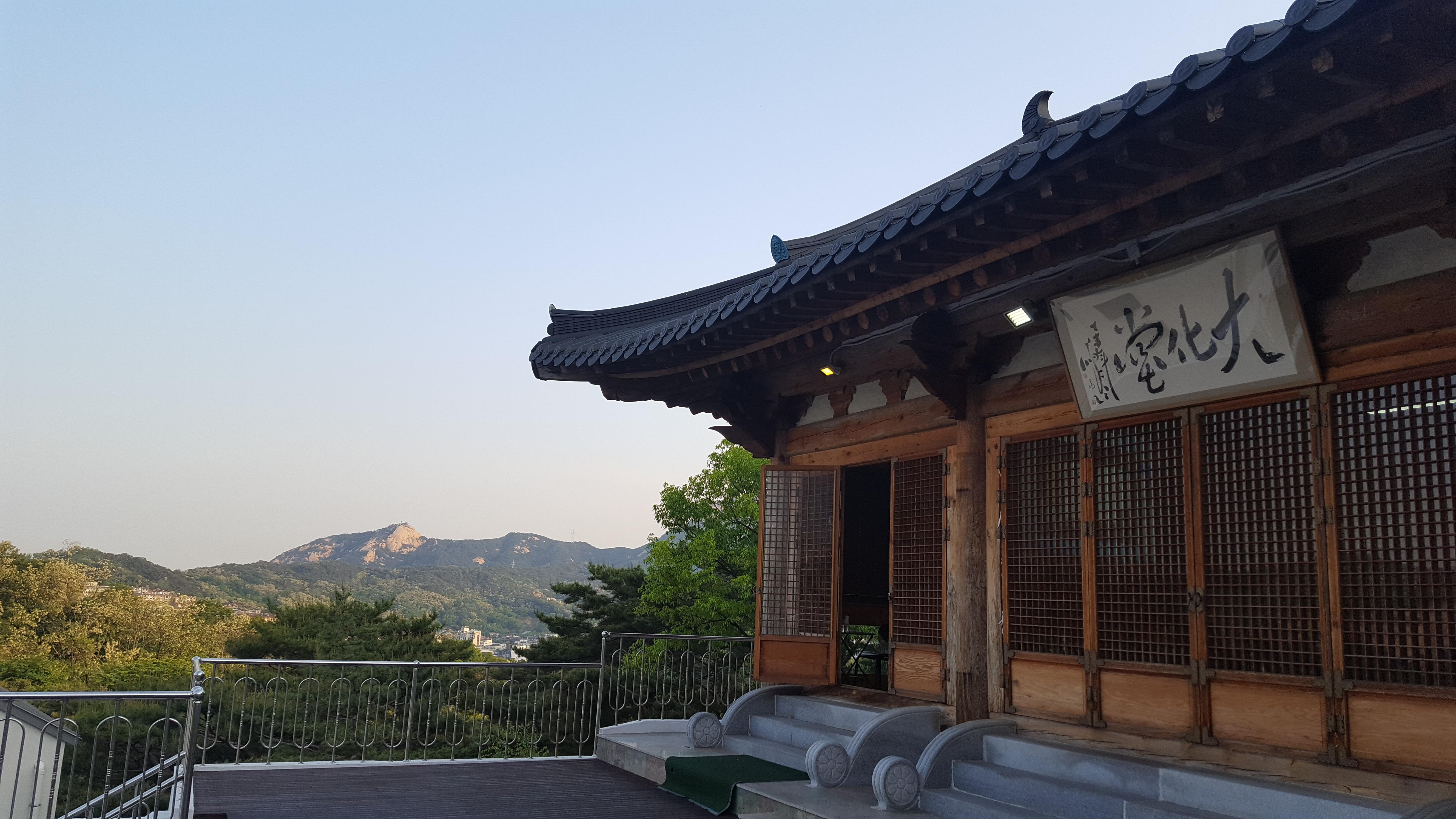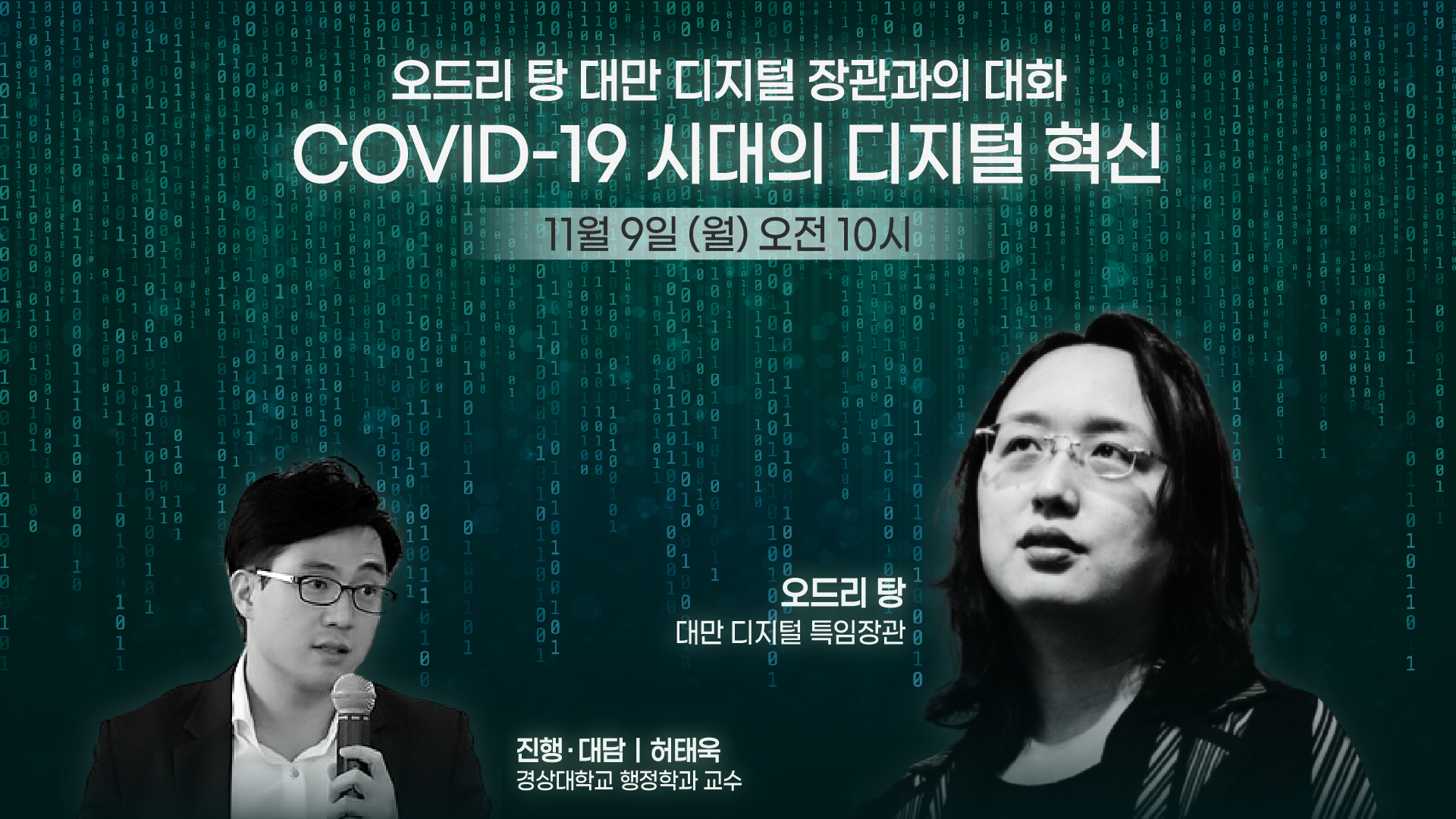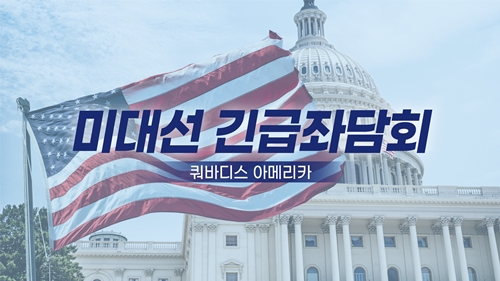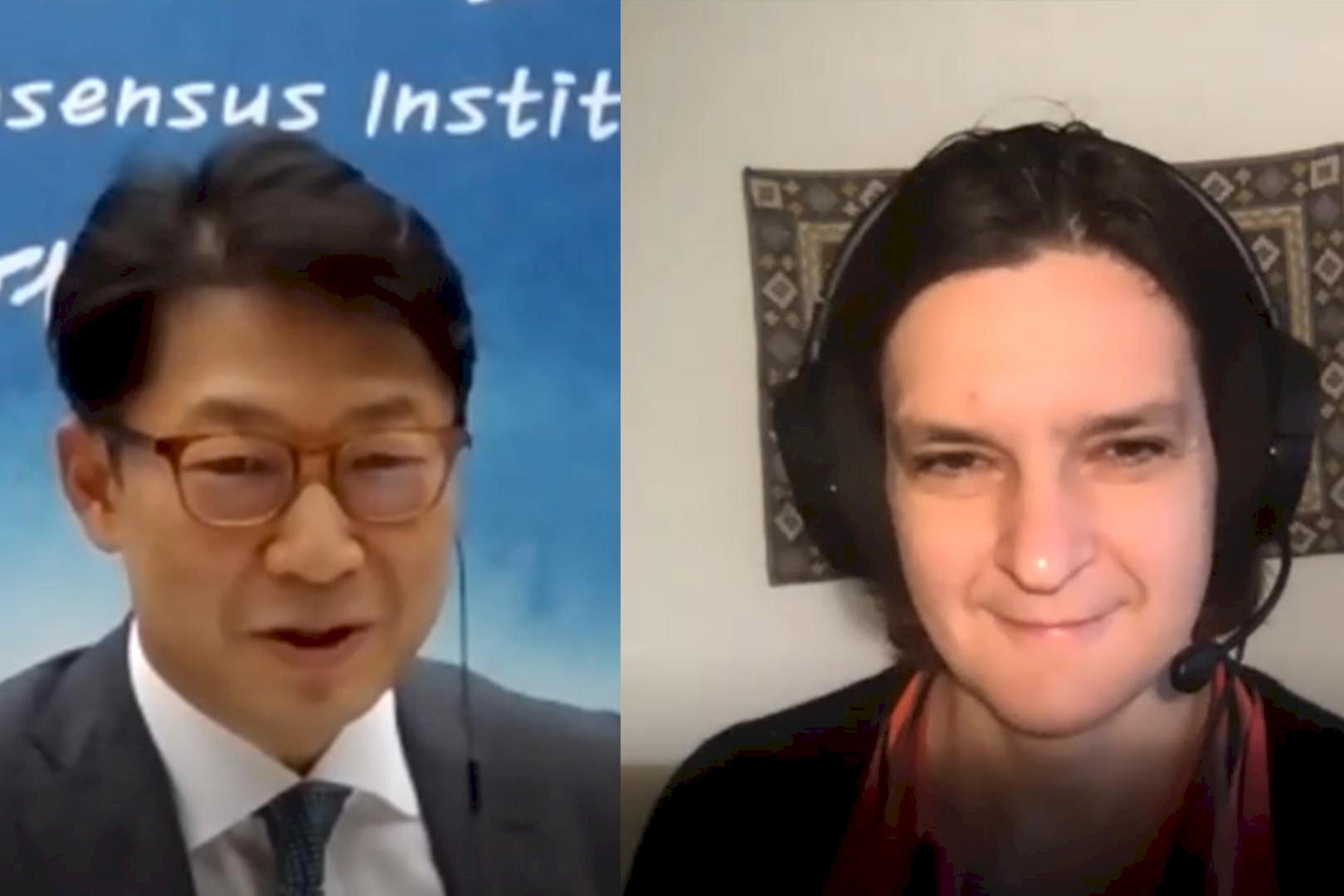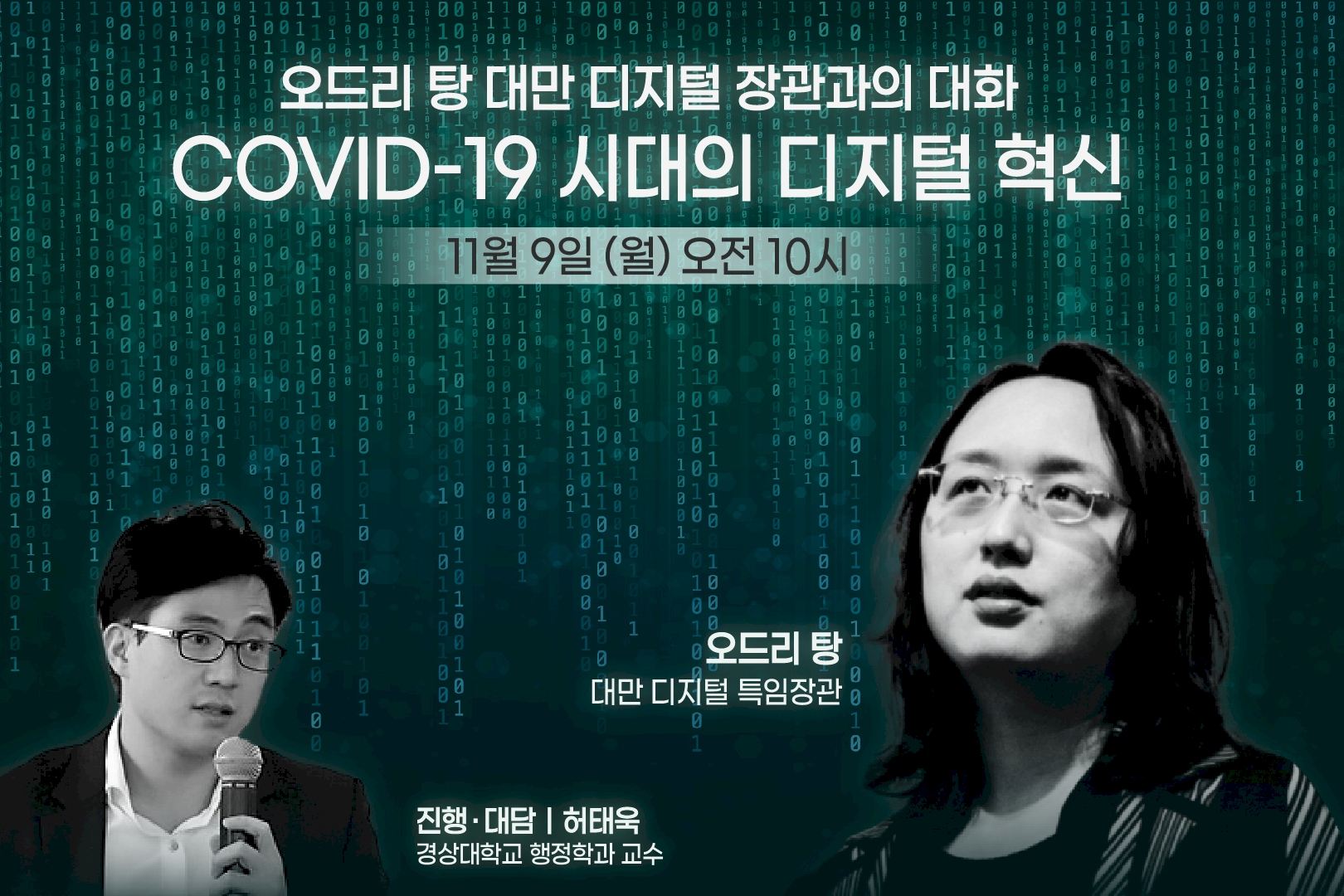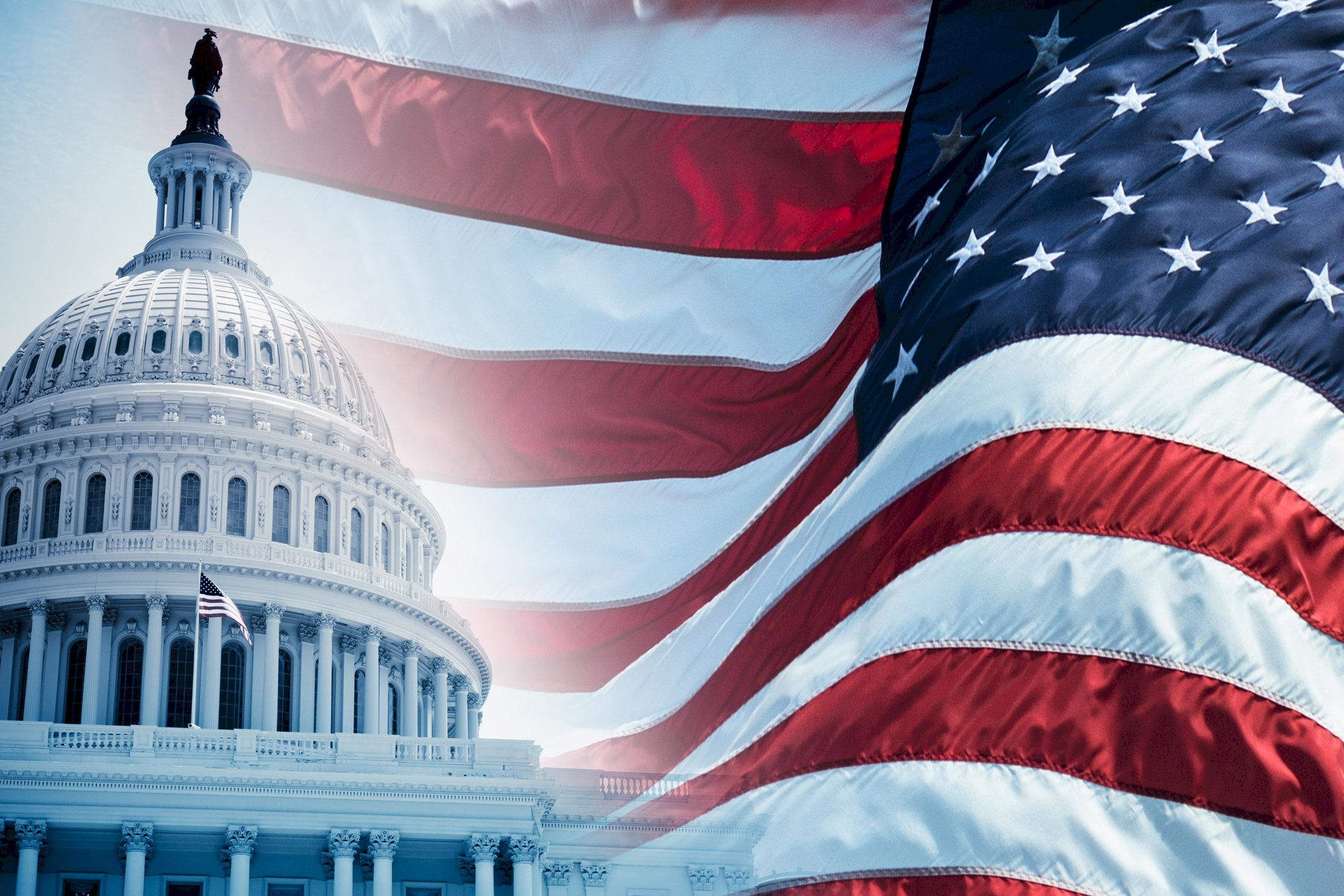Please join Yeosijae as we build a brighter future for Korea. Create your account to participate various events organized by Yeosijae.
[Global Future Dialogue ⑨: A Conversation with Professor Kishore Mahbubani] “You cannot treat a tiger (China) like a cat.”
- The China Challenge and the Future of Asia
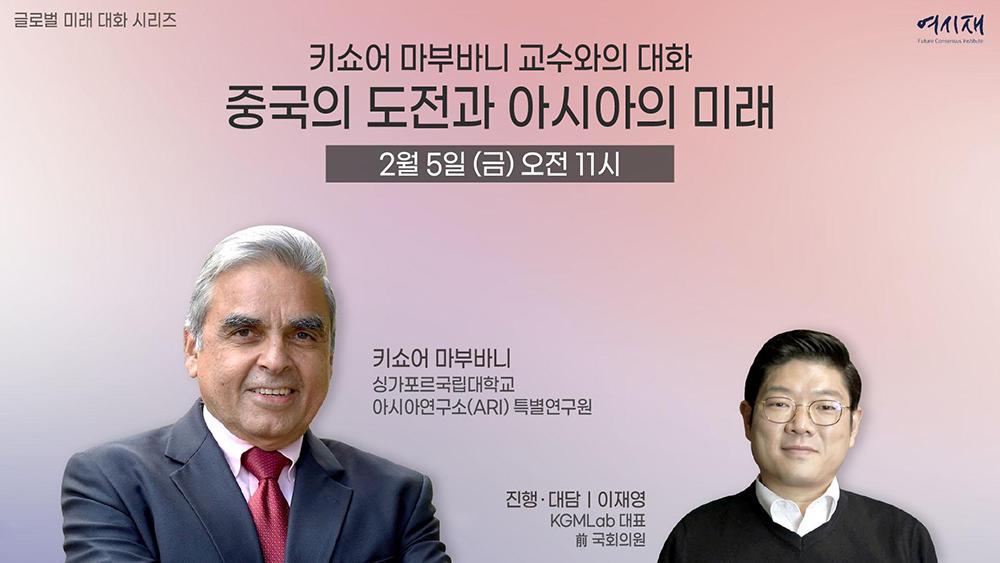
Speaker: Kishore Mahbubani
Distinguished Fellow at the Asia Research Institute, National University of Singapore, former Ambassador of Singapore to the UN and former President of the UN Security Council, former Founding Dean of the Lee Kuan Yew School of Public Policy at the National University of Singapore.
Moderator: Jaeyoung Lee
President of KGM Lab, Yeosijae Advisor, former Member of the National Assembly of the Republic of Korea, former Associate Director of Asia at the World Economic Forum
The tensions between the U.S. and China are intensifying, affecting countries across the world in various ways. COVID-19 has become a global challenge that brought with it radical changes in every sphere of our life. There has never been a more urgent need for cooperation and peace in the world, and against this backdrop, Yeosijae spoke with global experts to look for solutions to our problems. Through webinars and interviews conducted under the “Global Future Dialogue,” “Yeosijae Interview,” and “Outlook 2021” series, we had a chance to exchange ideas with prominent thinkers from the U.S. and Europe, including Prof. Joseph Nye, Prof. Charles Kupchan, Prof. Esther Duflo, Dr. Richard Haass, and Mr. Frank Jannuzi.
In our search for a leading expert on Asia, we came across the book of Prof. Kishore Mahbubani, “Has China Won?”, which explores many important questions regarding U.S. and China relations. On February 5, Yeosijae invited Prof. Mahbubani, Distinguished Fellow of Asia Research Institute, to discuss the rise of China, the U.S.-China competition, and the future of Asia. Prof. Mahbubani is an expert with 33 years of diplomatic career, a renowned academic, and a leading global thinker. The interview was moderated by Mr. Jaeyoung Lee, President of KGM Lab, former Member of Parliament, and Yeosijae Advisor.
The conversation raised insights from the book “Has China Won?” in connection with recent developments such as the Quad, the RCEP, and the riot on Capitol Hill, suggested a roadmap for the U.S. in dealing with China, and discussed Singapore’s strategy and its lessons for South Korea with flashbacks to Prof. Mahbubani experience among other important issues.
The interview highlights are provided below.
The full interview in English is available on Yeosijae’s YouTube channel.

“It is quite normal for the West to feel uncomfortable with its loss of power.”
Q. Your book helps the readers understand why China is acting in the way it is, how China became what it is today and how the U.S. is actually the one who is failing. However, according to the Pew Research Center survey of fourteen countries conducted last year, China’s popularity is decreasing. Do you not agree that China is – not doing what it can to increase its popularity with the rest of the world?
A: There is a very important statistic you should bear in mind when you talk about China and the world. In the world, there are 7.5 billion people¹. 12% live in the West. 88% live outside the West. Clearly, most of the countries covered by the Pew survey are Western countries. As I explained in my book, we are reaching the end of the 200 years of Western domination of world history, and we are now seeing the return of Asia — China, India, and other Asian countries. So psychologically, it is quite normal for the West to feel uncomfortable with its loss of power. At the same time, out of 193 countries in the world, over 130 countries have joined China’s Belt and Road Initiative (BRI). They are free to choose whether to join or not. So, if more than ⅔ of the countries in the world want to join the BRI, how do you say that China is becoming more and more unpopular? Many poor countries are desperate to get vaccines, and they will get them not from the U.S. or Europe; they will get the vaccines from China. And then, a year from now, when you do the surveys of the 7.5 billion people in the world, the majority will thank China for the vaccines.
¹ 7.8 as of 2021 according to the UN population estimates
“If China does not become a part of the solution, it becomes a part of the problem.”
Q: South Korea was also very enthusiastic about the BRI initially, but upon seeing how the BRI will move forward, we have become much more hesitant. What, in your opinion, should the Korean government do, given its relationship with the U.S. and its strong economic ties with China? What should South Korea expect from China in the coming years?
A: I think the first point now to emphasize is that, in international relations, never be enthusiastic. Always be realistic. Korea has lived next door to China for 5,000 years. So you have to be very realistic. It is always very uncomfortable living next door to a bigger neighbor. You can ask Mexico whether it is comfortable living next to the U.S.
As for BRI, I must emphasize that South Korea must make a distinction between what the Anglo-Saxon media reports about the BRI, which is all negative, and the reality, which is much more nuanced. For example, there are economic studies done by Prof. Deborah Bräutigam, peer-reviewed by Chatham House, which tell that all these stories about debt-trap diplomacy are untrue, that actually, it is the countries themselves that are making the mistakes, and China is trying to help them come out of this. At the end of the day, it is completely voluntary.
In the case of South Korea, you have a unique strategic challenge. You have a divided Korean Peninsula. That is your number one strategic priority. To put it very simply, if China does not become part of the solution, it becomes part of the problem. You would have to stand up to China from time to time. But nonetheless, you must find ways and means of getting along with China. Do not think in the next two or four years— think in the next 1,000 or 2,000 years.
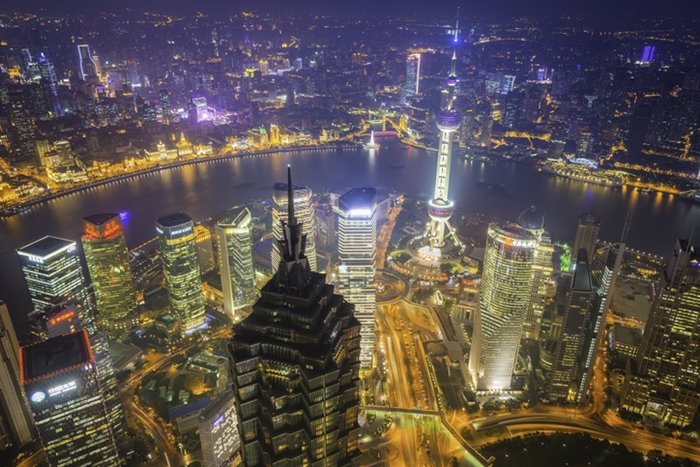
Q: Going back to the Pew research, the majority of the surveyed countries were Western; however, Japan and Korea were also among them, and our sentiments about China were also decreasing quite fast. There is a sentiment in Korea that China is no longer the China that we expected or the China we have seen over the past 20 years, especially after Xi Jinping. We do not know what China is going to do with its huge power. Do you agree that it is something we should be worried about?
A: I think you should always be. In 1980, China’s GNP in purchasing power parity terms was 10% of the U.S. That was the time of Deng Xiaoping. By 2014, 34 years later, China’s GNP had become bigger than the U.S., so the “cat” had become a “tiger.” I think it is unrealistic to expect that you could treat a “tiger” like a “cat.” You got to treat a “tiger” like a “tiger.” That’s the reality. You have to deal with it.
So, the biggest danger in international relations is engaging in wishful thinking, such as “I wish Deng Xiaoping would come back!”. It will not happen. It’s a bigger country, and I guarantee you if Deng Xiaoping were the leader of China today, in 2021, he would be as assertive as Xi Jinping because there is also Chinese public opinion. There is a Harvard Kennedy School academic study that shows that support for the Chinese government has gone up in the last ten years in China. Why? Because the Chinese government has delivered the greatest improvement in the standard of living of the Chinese people. The last 40 years have been the best 40 years in 4,000 years of Chinese history.
At the same time, even though China has become more “assertive,” China has not become “aggressive.” There’s a big difference between the words “assertive” and “aggressive.” To understand what “aggressive” means, I quote Professor Graham Allison:
Americans enjoy lecturing Chinese to be “more like us.” Perhaps they should be more careful what they wish for. (Has China Won, p.88)
Because when America became powerful in 1890 and
…in the decade that followed his (Theodore Roosevelt’s) arrival in Washington, the U.S. declared war on Spain, expelling it from the Western hemisphere and acquiring Puerto Rico, Guam, and the Philippines, threatened Germany and Britain with war unless they agreed to settle the disputes on American terms; supported insurrection in Columbia to create a new country, Panama, in order to build a canal. (Has China Won, p.88)
This is how great powers behave, right? If Teddy Roosevelt were running China today, the first thing he would do is take over all the islands in the South China Sea. He can just kick out Malaysia, the Philippines, and Brunei easily. So actually, in terms of how great powers behave, relatively speaking, China has been very restrained. China has not fought a war in 40 years. Now, how many wars has the U.S. fought in the last 20 years? The U.S. has spent 5.1 trillion dollars on overseas wars. It has dropped 175,000 bombs on several countries and killed 800,000 in these wars. Just imagine if China behaved like the U.S., what kind of world would we have?
“China is not benevolent because no great power is benevolent. No great power sacrifices its own interests to benefit other countries.”
Q: To your point, the statistics speak for themselves. You think we have a very benevolent giant— the tiger next door is actually a tiger that we can live together. Let me just ask you another quite controversial question in regards to that. Korea and Japan, and most of the countries in Southeast Asia are democracies. Looking at what happened in Hong Kong, the adoption of China’s Hong Kong National Security Law is one of those small activities that China has done, which you don’t say is aggressive but assertive. However, it leads to the question of “what could come next.” Do you not think we should be alarmed about what is happening in Hong Kong?
A: You used the word “benevolent.” China is not benevolent because no great power is benevolent. No great power sacrifices its own interests to benefit other countries. All great powers put their interests first. This is true of the Roman Empire, the Tang Dynasty, the British Empire, and the U.S. as a hegemon — all great powers put their interests first. China will not sacrifice its interests to benefit other countries. No great power does it. The only question is whether you can align your interests with the great power. Then you can work with the great power. That is how international relations work.
As for Hong Kong, the simple point here is that Hong Kong is part of China, as Jeju province is part of Korea. It is a mistake for the rest of the world to tell China what to do in Hong Kong because Hong Kong is part of China. Hong Kong was seized from China in the Opium War. It is a symbol of the century of humiliation that China suffered at the hands of Western powers. Frankly, China has been surprisingly generous in allowing 50 years of autonomy in Hong Kong. China did not send troops and take Hong Kong over in 24 hours, contrary to what Prime Minister Jawaharlal Nehru did in Goa. So, it’s a mistake for the West to provoke China on Hong Kong.
The biggest mistake the U.S. made was to praise the violent demonstrations in Hong Kong when the demonstrators attacked the legislative assembly. Nancy Pelosi praised that. When the Capitol was stormed, how did the U.S. react? Nancy Pelosi got very angry! How can Nancy Pelosi support a violent attack on the legislative assembly in Hong Kong and protest against a violent attack on the Capitol? The use of violence should always be condemned. If the West was logically and morally consistent, the West should have said: “We support peaceful demonstrations in Hong Kong. We condemn violent demonstrations in Hong Kong.”
If I make a very provocative point, the West is not interested in the well-being of the Hong Kong people. The West is interested in using Hong Kong as a propaganda weapon against China. Hong Kong people should not allow themselves to be used as a propaganda weapon against China.
“If the U.S. wants to counterbalance China, it should join the Trans-Pacific Partnership instead of the Quad.”
Q: The next question is about another regional issue that is important to South Korea, the Quad. Korea has not joined, but we are definitely talking about how to handle this situation. The U.S. has become “pompous” after the Cold War, and they do not work well with partners anymore. We saw that at its height when Trump came in. However, is the Quad not the manifestation of the U.S. now recognizing that they cannot handle China alone?
A: I must emphasize that countries have the sovereign right to join any organization they want to. At the same time, I am trying to tell the Americans that the contest between the U.S. and China will not be a military contest. It will be an economic contest. Therefore, when you try to set up a military counterbalance to China (through the Quad), it will fail. The Quad will fail because it is playing the wrong game. The right game is the economic one. If the U.S. wants to actually counterbalance China, instead of joining the Quad, it should join the Trans-Pacific Partnership. If the U.S. keeps its military presence but loses its economic weight in the region, it will become a lesser and lesser player.
China, by contrast, has signed the RCEP, which South Korea and Japan have also joined. And that is the conclusion of my article on Quad: the future of the region will be determined by the RCEP and not by the Quad. That is why I think it is a mistake for India not to join the RCEP. If the U.S. wants to counterbalance Chinese influence in the region, it should encourage India to join the RCEP. I speak as a friend of the U.S., encouraging the U.S. to adopt a more intelligent policy.
One of the biggest strategic mistakes that the U.S. has made is the amount of money it has wasted in the military dimension. The U.S. has spent 5 trillion dollars fighting wars in the last 20 years since 9/11. The U.S. is also the only major developed country where the average income of the bottom 50% has gone down over the 30-year period. That has created a sea of despair among the white working classes, and that is how Donald Trump was elected. As a friend of America, I say, do not spend 5 trillion dollars fighting useless wars such as in Afghanistan, Syria, and Iraq that have achieved nothing. All failures. The U.S. is the only country that spends 5 trillion dollars to achieve failures. Why not give the 5 trillion dollars to the bottom 50% in America so that they can see an improvement in their lives? Each member of the bottom 50% will get a check for 30,000 dollars. A check for 30,000 dollars is important for Americans because today, 60% of Americans do not have access to 400 dollars in emergency cash. I am sure 60% of South Koreans have access to 400 dollars in emergency cash. So how is it a very rich country like the U.S. has lost its way? I want to help the U.S. find its way and become strong again. To become strong again, it has got to think strategically, stop wasting money on military expenditures, and spend money to improve the economic well-being of its people.
Q: You talked about the system failure in the U.S. Can it make a U-turn?
A: That is what I am trying to do in my book, “Has China Won?”, which is why the thoughtful Americans, like Lawrence Summers, the former president of Harvard University, that have read my book like it. Americans like my book because they understand I am trying to help America become strong again. America has developed some structural weaknesses, and one structural weakness is America has become a Plutocracy. I am not the only one saying America has become a plutocracy. Since South Korea is a friend of the U.S., South Korea should speak as frankly to the U.S. as I do and help the U.S. become strong again.
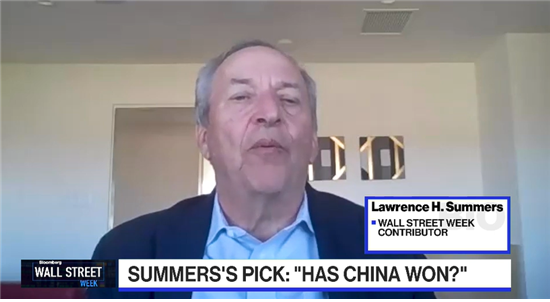
as one of his three picks for the best books of 2020.
(Image source: Bloomberg Interview)
“The U.S. should not see China’s rise as necessarily one that will damage the U.S.
What China threatens is American primacy but not the American people.”
Q: Your book, on the surface level, sounded like you were praising China and saying America is no longer the great superpower, but it was actually giving a detailed roadmap of what the U.S. needs to do in the coming years to regain its glory. I thought Chinese officials actually might not like your book.
A: I’m asking the U.S. to work out a clear, comprehensive long-term strategy for dealing with China, and that is why Chinese officials would like my book. The man who told me the U.S. does not have a strategy was Henry Kissinger. In the book, I describe a one-on-one lunch I had with Henry Kissinger in March 2018, when he told me that the problem with the U.S. is that it does not have a strategy for dealing with China.
The U.S. should not see China’s rise as necessarily one that will damage the U.S. The simple question that American strategic thinkers should ask is: “Does China threaten America?” It looks like a simple question, and the answer for most Americans is “yes.” But the correct answer is “no” because China is not planning to invade the U.S. militarily. China is not thinking of sending aircraft carriers 200 miles off American shores, exporting the communist party system to the U.S., and bringing down the U.S. economy because China relies on the American market for its exports. What China threatens is American primacy but not the American people. What is more important, the well-being of your people or the primacy of America? I think the well-being of Americans is more important at a time when you have the deaths of despair rising in America. America should focus its energy on helping the American people. I want Biden to succeed. But the way to succeed is not to waste money engaging in a geopolitical contest against China but to compete with China in some areas and cooperate in others. We, countries like South Korea and Singapore, should explain to the U.S. that we want to be friends with America, but we also have to be friends with China. We do not want to choose one or the other.
Q: You said in your book that “even after Trump leaves office, the next president will not be able to restore the trust in America that Trump has eroded.” Now Biden is in there. Do you still think Biden cannot restore the trust, or what do you think he should do to restore the trust, at least in this region?
A: I think most people would answer by saying: “Can you assure me that we will have at least 8 to 12 to 16 years of a Biden-like administration?” I can tell you the likelihood. 4 years from now, Biden will be 82, and he will probably be a single-term president. If there is a contest between Kamala Harris, Donald Trump, or a Donald Trump-like person, Donald Trump can win again in 2024.
Is America now interested in South Korea’s or East Asian welfare, or only its own welfare? That is the question you have to ask. I think Biden will be a very good president. I think he will be much more courteous and polite. I think it was a tragedy that even though Donald Trump met Kim Jong Un, his negotiators, Mike Pompeo and John Bolton, wanted North Korea to surrender. They did not try to meet North Korea halfway, which would have been a sensible thing to do. At the end of the day, you have, from South Korea’s point of view, a government that goes one extreme to the other. We want the U.S. to play a role in the region, but we want the U.S. to develop a strong bipartisan foreign policy that does not rotate every four years and goes here and there.

“The U.S. should work up a thoughtful, long-term credible strategy.”
Q: I understand your point that it will be very hard to imagine consistency from America. Do you think the entire system or the institutions of America that we see as a beacon of hope or the city on the hill have failed completely?
A: During the Cold War, the U.S. went from Republican to Democrat to Republican, but the policies remained consistent. For example, Jimmy Carter started the fight in Afghanistan against the Soviet Union, and Ronald Reagan continued. There was a bipartisan consensus on what should be done in dealing with the Soviet Union. In the same way, the U.S. should work up a thoughtful long-term credible strategy. George Kennan, even though he is known as the father of the policy of containment, also had very thoughtful ideas on how you manage great power competition. George Kennan disapproved military expenditures. He said that the outcome of the contest between the U.S. and the Soviet Union will not be determined by how many bullets or bombs you have; it would depend on the spiritual vitality of the society, which society has a stronger economy and society. Therefore, it is better for the U.S. today to cut down its defense expenditure and spend more money on improving its society and well-being. The contest is an economic one. So, as I keep emphasizing, my arguments are to help the U.S. make a U-turn and adopt more credible, long-term strategic policies. Then those long-term strategic policies can then develop a bipartisan consensus in the U.S. But the U.S. today has become so polarized, precisely because, as George Kennan says, the society lacks spiritual vitalities. It has become very divided, and a divided America is not good for South Korea and Singapore. We should help America heal itself and become stronger again.
“If North Korea is an enemy of the U.S., the first thing the U.S. should do is establish diplomatic relations with North Korea so it can talk to North Korea.”
Q: Going back to the Korean peninsula, Kim Jong Un and Donald Trump’s meeting in Singapore did not come to what we had expected. Today’s situation could be even worse than what it was before. As a career diplomat, great thinker, and strategist, what kind of advice would you have for South Korea, the U.S., and China regarding North Korea, especially on the nuclear issue?
A: The purpose of diplomacy is to talk to your enemies. The U.S. has misunderstood what diplomacy is all about. The U.S. wants to establish diplomatic relations with only friends, not with enemies. That is a complete misunderstanding of why diplomacy came about. For example, if North Korea is an enemy of the U.S., the first thing the U.S. should do is establish diplomatic relations with North Korea so it can talk to North Korea. This is something that is common sense. North Korea is not going to go away. Number one principle of realism: talk to North Korea, establish diplomatic relations with North Korea. Number two: the biggest strategic decision the U.S. has to make is to decide whether the U.S. wants to go for regime change or behavior change. The U.S. policy has been oscillating towards North Korea, sometimes behavior change, sometimes regime change. When the U.S. signed the agreement on KEDO, the U.S. did not follow through that agreement. In some memoirs written by American officials, they say they signed the agreement on KEDO in the belief that the North Korean regime would collapse. That is dishonest and dishonorable. It is in South Korea’s interest to encourage the U.S. to adopt intelligent, thoughtful, long-term strategic policies towards North Korea. South Korea should advocate that the U.S. should establish a diplomatic relationship with North Korea. I was a diplomat for 33 years, and the best way to persuade people is to talk to people face to face.
I will give you a concrete example. In the Cold War, after the Vietnamese invasion of Cambodia—Vietnam, by the way, is a communist-run country— Vietnam and Singapore fought each other. I used to have very fierce debating matches against the Vietnamese ambassador in 1984, 1985, 1986, 1987, 1988. The Cold War ended, and Vietnam joined the ASEAN. Do you know who was Vietnam’s best friend in the ASEAN? It was Singapore. Within six years, we became good friends, and Singapore set up an industrial park in Vietnam. This was possible because we were talking to each other all the time.
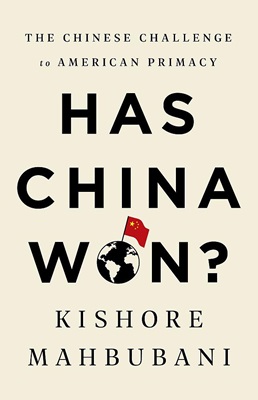
“South Korea must understand ASEAN and work with ASEAN and then use ASEAN as a way of restraining Japan and China.”
Q: We are going into the final minutes of our conversation. Let’s talk about the future. You talked about how things are shifting from the West to the East. The West tried to call us Asians, but we are very dynamic and diverse in terms of ethnicity, religions, and cultures. But is there what we would call the “Asian value” that connects all together? Do we even need one to prepare ourselves for the coming centuries?
A: I think there are no universal “Asian values” among all Asian societies. We are very different and diverse. The one real hope in Asia is ASEAN. I wish South Koreans would understand the ASEAN and the ASEAN miracle even more. People do not realize that the most successful regional organization in the world in some ways is ASEAN, because in ASEAN, out of 650 million people, there are 250 million Muslims, 150 million Christians, 150 million Buddhists, and also Taoists, Confucianists, Hindus, and even communists in Vietnam. It is the most diverse region on the planet Earth. In theory, the Christians, the Muslims, and the Buddhists should be fighting each other. Why is there peace in ASEAN? This is because the ASEAN has injected the culture of “musyawarah and mufakat” (consultation and consensus). This is what we should teach the Americans to do. Do not come and bang the table and say you’re with us or against us. Have consultation and consensus. This is the reason why East Asia is the fastest-growing region in the world and the reason why we have the RCEP.
The RCEP only happened because the ASEAN signed free trade agreements with China, Japan, South Korea, Australia, New Zealand, and India. If China, Japan, and South Korea sat down in a room and tried to negotiate a free trade agreement, they would fail because there is distrust within South Korea and Japan, within Japan and China, within China and South Korea. Because ASEAN created the RCEP umbrella, under this umbrella China, Japan, South Korea signed a free trade agreement. The three countries should thank ASEAN publicly. China, Japan, and South Korea should come together and write a letter of thanks signed by them saying, “Thank you, ASEAN. Because of you, we managed to get a free trade agreement among ourselves. Otherwise, we would have never succeeded.”
Therefore, it is important for South Korea to not be caught in the Western mindset. South Korea, for example, must understand ASEAN and work with ASEAN and then use ASEAN as a way of restraining Japan and China.
“The solution is not to impose sanctions. The solution is to have a dialogue.”
Q: Talking about the ASEAN, are you worried about what’s happening in Burma?
A: Very worried. But the solution is not to impose sanctions. The solution is to have a dialogue with the military regime and tell them this is not going to work, that the era of military regimes is over. But the way you do it is by talking to them and dealing with them, not by imposing sanctions on them.
Q: Towards the end of your book, you said personalities do matter. It is at the end of the day who’s sitting across the table that really matters when it comes to negotiations. It is definitely pleasant to have you at the other end of the table. Hopefully, Biden’s new administration will be able to sit down with China together and have something to resolve peacefully and cooperatively rather than creating more conflicts. It seems Biden is trying to do that, at least by talking about climate. Any final words?
A: I think we should all help Biden succeed. Because if Biden fails, another Trump or Trump-like figure will come back, and the second Trump-like figure will be even more disruptive. Trump 2.0 will be more disruptive than Trump 1.0, so we should help Biden succeed. The only way to help Biden succeed is to speak to him frankly and to say, don’t try to increase your military presence in East Asia. That is not what the region needs. The region needs your economic presence in East Asia. Please come back and join the Trans-Pacific Partnership. Please come back and engage in economic exchanges with the region, and for the time being, press the pause button on the trade war with China, and try to work together with China to kill COVID-19. Because once COVID-19 is killed, the U.S. economy will bounce back up, and if the U.S. economy bounces back up, then Biden or another democrat candidate can be re-elected again. So, we should give strong, sensible advice to the Biden administration.
References
1. Deborah Brautigam. (2019). A critical look at Chinese ‘debt-trap diplomacy’: the rise of a meme. Area Development and Policy. 5. 1-14.
2. Edward Cunningham, Tony Saich, and Jessie Turiel. (2020). Understanding CCP Resilience: Surveying Chinese Public Opinion Through Time. Harvard Kennedy School Ash Center for Democratic Governance and Innovation.
3. Kishore Mahbubani (2021, January 27). Why Attempts to Build a New Anti-China Alliance Will Fail. Foreign Policy.
4. Kishore Mahbubani. Has China Won? The Chinese Challenge to American Diplomacy. PublicAffairs, New York, 2020. pp. 310.
5. Lawrence H. Summers’s Top Books of 2020. Bloomberg Markets and Finance. Wall Street Week.
6. Pew Research Center, October 2020, “Unfavorable Views of China Reach Historic Highs in Many Countries.”
< Copyright holder © TAEJAE FUTURE CONSENSUS INSTITUTE, Not available for redistribution >

